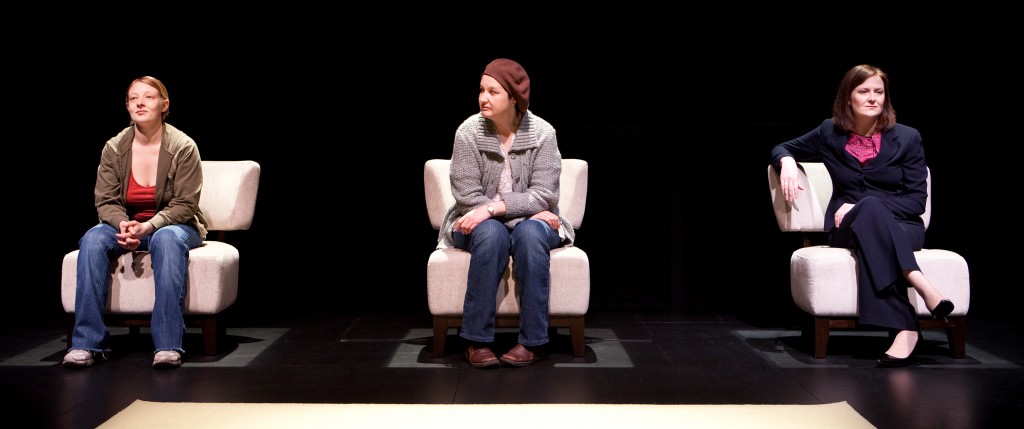By Darryl D’Souza

I have conflicting feelings about Daniel MacIvor’s latest play, Communion, playing at Tarragon Theatre (where, incidentally, MacIvor is the new playwright-in-residence). To be fair, I am a huge fan of MacIvor, so my expectations for this play were very high. I’ve actually been waiting to see Communion ever since I first heard about it last September.
However, experience has taught me that high expectations – whether they’re for a play, novel or film – are often a sure-fire recipe for disappointment. I was disappointed to a certain extent, but also enthralled with the intriguing characters, their complex relationships with each other and the fact that it was far more political than MacIvor’s last Tarragon play, A Beautiful View.
A little background, in case you aren’t familiar with MacIvor or his work. Daniel MacIvor is a lot of things to a lot of people. Many people consider him to be one of Canada’s most important playwrights. He hails from Cape Breton, Nova Scotia, proving that things come to Toronto from Canada’s East Coast besides fresh fish, lobsters and potatoes. MacIvor is also often considered one of the most important voices of queer culture in Canada. Personally, I really loved MacIvor’s film Whole New Thing, where a teenage boy falls in love with his English teacher, played by MacIvor himself.
Communion explores another aspect of MacIvor, specifically his Catholicism. For those of you unfamiliar with Catholicism, communion is a religious rite practised weekly where it is believed God literally enters your body. To a certain extent MacIvor plays with the idea throughout the play.
There are three characters in Communion: Leda, a former alcoholic who was raised Catholic, but isn’t religious and may be an atheist; Carolyn, Leda’s psychotherapist, who is a lesbian and an atheist; and Ann, Leda’s daughter, who is a born-again Christian right-to-lifer, who was imprisoned for burning down an abortion clinic. Ann believes that God is inside her and that her actions are truly the will of God. Leda is unwilling to believe in the type of God that her daughter Ann does, whom she derisively refers to as a God who “hates fags and loves uteruses”.
Without giving too much away, after Ann finds out that her mother’s “head doctor” is a lesbian, she is overcome by the irrational fear that her mother, who has been divorced from her father for many years, is actually a lesbian. Sexual orientation, religious beliefs and human relationships all continuously intersect in sometimes fascinating ways in Communion.
As I said, I have mixed feelings about the play. I hated the first act, loved the second act and thought the third act was good but not great. I went to the play with my sister Gwen, and she liked and hated the same acts as me. But most of the audience seemed to be laughing throughout the whole thing. Although I did hear someone whisper in front of me during the first act: “this is really bad”. Hopefully, like me, they liked the second and third acts more.
Unlike the picture, each act features two different actors paired up together. In the first act, it’s Leda, played by MacIvor regular Caroline Gillis, and her shrink Carolyn, played by Sarah Dodd, in Carolyn’s office. The second act features Leda and her daughter Ann, played by Athena Lamarre, in a hotel room. Then the third act has Ann meeting with her mother’s lesbian therapist, Carolyn, in her office again. All three acts have a very minimalist set. The first act features absolutely nothing more than three identical white comfy looking chairs. The second: a bed, nightstand, and literally one or two other objects.
Communion is thus very much in the same spirit of A Beautiful View, where there were absolutely no props or constructed backgrounds at all. I think MacIvor, like Brecht, avoids a conventional set to prevent the audience from being drawn into the world of the story. MacIvor seems more interested in exploring human nature and topical issues like abortion, sexuality, and religious fanaticism, than creating a more conventional non-political escapist drama.
If you’re a fan of Daniel MacIvor, Communion delivers the exploration of gay and lesbian themes that you’ve come to expect from him, as well as poignant relationships between family members. The relationship between Leda and her daughter Ann really touched me, and I found it to be almost as powerful and moving as the relationship between the drunken mother and her three daughters in Marion Bridge, which is perhaps MacIvor’s best play to date. Communion has a lot to offer, so if this review has piqued your interest, check it out.
Details:
–Communion is playing at Tarragon Theatre (30 Bridgeman Avenue) until April 4, 2010.
-Shows run Tuesday through Saturday at 8 pm, with Saturday and Sunday matinees at 2:30 pm.
-Prices start at $20; seniors’ and students’ prices are available. Friday night and Sunday matinee rush tickets are $10.
-Tickets are available online or through the box office at 416-531-1827.
(Photo by Cylla Von Tiedemann, of left to right, Athena Lamarre, Caroline Gillis, and Sarah Dodd)

One thought on “Communion – Tarragon Theatre”
Comments are closed.